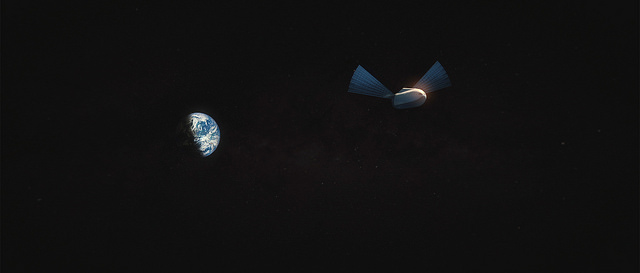SpaceX
Yes, we deserve to colonize Mars and keep our “light of consciousness”
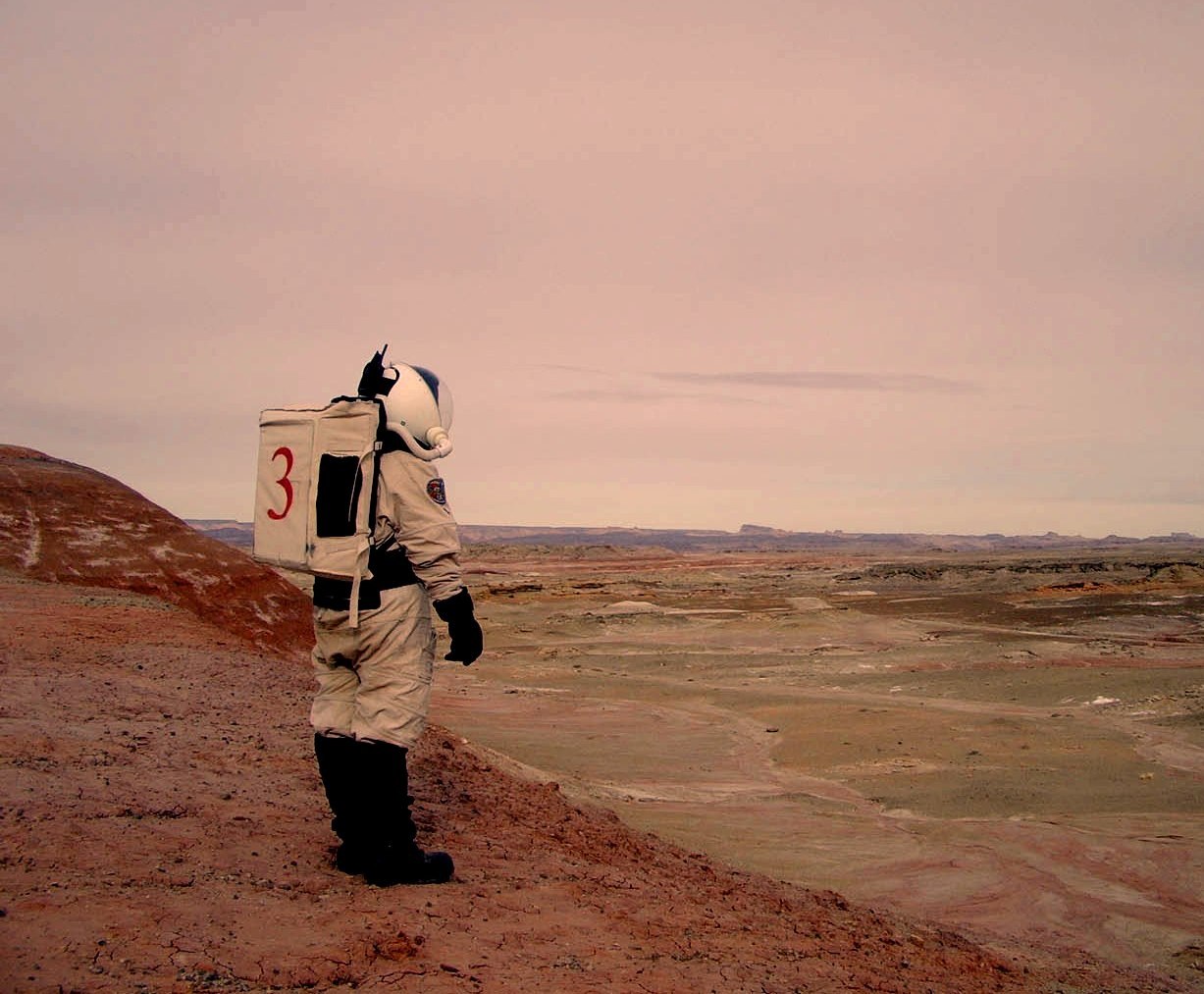
Elon Musk has spoken previously about having a duty to maintain the “light of consciousness” of humanity as the main rationale for multi-planetary habitation, or why we should colonize Mars specifically. It’s a pretty simple concept, really. Eventually the Earth will no longer be able to host human life as we know it, suffering from some sort of malady which will wipe out our species. Pick your poison: Asteroid attack, the Sun’s Earth-engulfing expansion, or even climate change. Something will bring us down, someday, unless we are proactive in our approach to survival.
Unfortunately, facts are fun things that don’t always help with solving problems (and annoyingly so), but it seems there’s also a crowd that doesn’t disagree with the facts and instead questions whether we even “deserve” to respond to them altogether.
In her recent TechCrunch article titled “The Ethics of Colonizing Mars”, Shivika Sinha cited Elon Musk, NASA, and the progress being made towards Mars and then asked the question, “Do humans deserve to be multi-planetary?”
 Her argument framed capitalism and consumerism as co-conspirators of our modern societal woes, and her conclusion was that we need to change our “parasitic” ways before exporting them to other planets in the universe. The whole argument was really just the human-shaming version of “fix Earth first”, a common objection to deep space colonization.
Her argument framed capitalism and consumerism as co-conspirators of our modern societal woes, and her conclusion was that we need to change our “parasitic” ways before exporting them to other planets in the universe. The whole argument was really just the human-shaming version of “fix Earth first”, a common objection to deep space colonization.
As a perfect, imperfect example of one of billions of humans on this planet, I will quite willingly admit that we are not a perfect species; however, I don’t understand why there’s so much guilt felt for merely existing in certain sects of society. It’s your choice whether to like who you are, but remember that you cannot live without living. You cannot stop pursuing the long-term survival of the species simply because you do not approve of its current state. Why aspire to be more if we are telling ourselves we are not even good enough to be such?
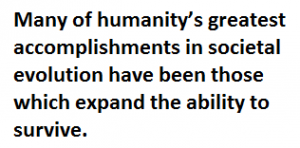 Behavior takes time to adjust. We do not live in a controlled, variable-limited scientific model society wherein our survival mechanisms are neatly categorized into “good” vs. “bad” choices. And more still, since when did survival become a question of worth? Many of humanity’s greatest accomplishments in societal evolution have been those which expand the ability to survive. Indeed, a huge part of compassion in our value system is the belief that everyone has the right to a life that is so much more than simply surviving. Given the consequences of not eventually going to colonize another planet, how does the logic compute that our species is suddenly not worthy of existence whatsoever?
Behavior takes time to adjust. We do not live in a controlled, variable-limited scientific model society wherein our survival mechanisms are neatly categorized into “good” vs. “bad” choices. And more still, since when did survival become a question of worth? Many of humanity’s greatest accomplishments in societal evolution have been those which expand the ability to survive. Indeed, a huge part of compassion in our value system is the belief that everyone has the right to a life that is so much more than simply surviving. Given the consequences of not eventually going to colonize another planet, how does the logic compute that our species is suddenly not worthy of existence whatsoever?
Sinha points to the flaws in our system which are in contradiction with the natural world, destroying it specifically, yet she doesn’t credit the source of the flaws to begin with: That same natural world. We were born in it, raised in it, and learned to survive based on those experiences. Somewhere along the line, we developed consciousness as a result of that process of surviving. We didn’t suddenly arrive on a beautifully balanced Earth ecosystem and begin sucking resources to feed our ravenous appetites. We fought hard to get here, and as an evolved species of this planet, we have the right to fight to continue to survive – just as every other living creature on Earth has done.
But that’s not the line of discussion I wanted to flesh out here.
Instead, I’d like to suggest that multi-planetary habitation is actually quite compatible with Sinha’s (and others like her) perspective because colonization is more than just a survival plan: It’s a tool for evolving our consciousness towards a value system which includes “conscious consumerism” by default.
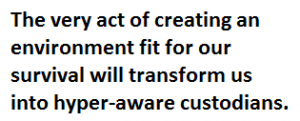 We evolved with the resources available in our Earth environment, and we’ve often taken them for granted because they were always there and available to us. When we take our species to colonize Mars, we will be doing just the opposite by transforming its environment to provide resources we need to survive. The very act of creating an environment fit for our survival will transform us into hyper-aware custodians. Every resource will be valued right down to the tiniest amounts measurable because even the most minute amounts will be important. Every action we take will have reactions that we must carefully calculate if we hope to survive.
We evolved with the resources available in our Earth environment, and we’ve often taken them for granted because they were always there and available to us. When we take our species to colonize Mars, we will be doing just the opposite by transforming its environment to provide resources we need to survive. The very act of creating an environment fit for our survival will transform us into hyper-aware custodians. Every resource will be valued right down to the tiniest amounts measurable because even the most minute amounts will be important. Every action we take will have reactions that we must carefully calculate if we hope to survive.
Taking the human race into deep space is so much more than “exporting” our consumerism once we’ve outgrown its birth place. It’s evolving who we are, increasing our awareness, and forcing us to understand the environments we will depend on and cannot risk taking for granted. We will be conscious of every choice we make as a matter of survival, and those lessons we learn in the early days of exploration will set the stage for the next phase of human colonization.
In the end, I think we’re all on the same page as far as long-term “colonize Mars” goals. The difference is simply in perspective. Taking our species to places like Mars isn’t an act based on some sort of contrived selfishness. It’s answering something we’ve had calling to us since the beginning of time: The stars. We came from them, and it’s to be expected that eventually we will want to return. Mars is the next step.
Onwards.

Elon Musk
SpaceX IPO could push Elon Musk’s net worth past $1 trillion: Polymarket
The estimates were shared by the official Polymarket Money account on social media platform X.

Recent projections have outlined how a potential $1.75 trillion SpaceX IPO could generate historic returns for early investors. The projections suggest the offering would not only become the largest IPO in history but could also result in unprecedented windfalls for some of the company’s key investors.
The estimates were shared by the official Polymarket Money account on social media platform X.
As noted in a Polymarket Money analysis, Elon Musk invested $100 million into SpaceX in 2002 and currently owns approximately 42% of the company. At a $1.75 trillion valuation following SpaceX’s potential $1.75 trillion IPO, that stake would be worth roughly $735 billion.
Such a figure would dramatically expand Musk’s net worth. When combined with his holdings in Tesla Inc. and other ventures, a public debut at that level could position him as the world’s first trillionaire, depending on market conditions at the time of listing.
The Bloomberg Billionaires Index currently lists Elon Musk with a net worth of $666 billion, though a notable portion of this is tied to his TSLA stock. Tesla currently holds a market cap of $1.51 trillion, and Elon Musk’s currently holds about 13% to 15% of the company’s outstanding common stock.
Founders Fund, co-founded by Peter Thiel, invested $20 million in SpaceX in 2008. Polymarket Money estimates the firm owns between 1.5% and 3% of the private space company. At a $1.75 trillion valuation, that range would translate to approximately $26.25 billion to $52.5 billion in value.
That return would represent one of the most significant venture capital outcomes in modern Silicon Valley history, with a growth of 131,150% to 262,400%.
Alphabet Inc., Google’s parent company, invested $900 million into SpaceX in 2015 and is estimated to hold between 6% and 7% of the private space firm. At the projected IPO valuation, that stake could be worth between $105 billion and $122.5 billion. That’s a growth of 11,566% to 14,455%.
Other major backers highlighted in the post include Fidelity Investments, Baillie Gifford, Valor Equity Partners, Bank of America, and Andreessen Horowitz, each potentially sitting on multibillion-dollar gains.
Elon Musk
SpaceX considering confidential IPO filing this March: report
The filing could pave the way for a June listing at a valuation that may exceed $1.75 trillion.
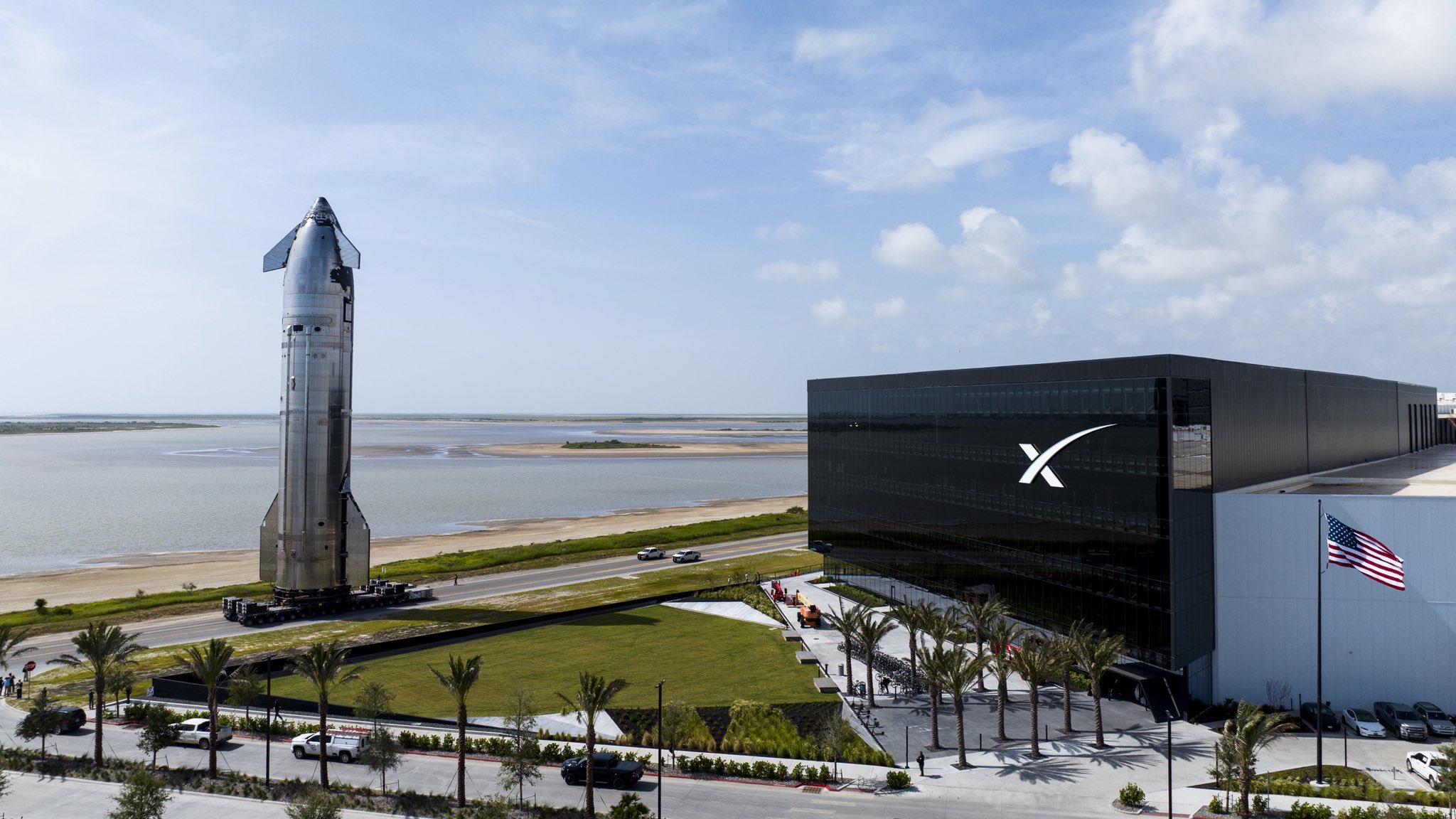
SpaceX is reportedly preparing to confidentially file for an initial public offering (IPO) as soon as March. The filing could pave the way for a June listing at a valuation that may exceed $1.75 trillion, potentially making it the largest IPO in history.
The update was initially reported by Bloomberg News, which cited information shared by people reportedly familiar with the matter.
As per the publication, a confidential filing allows a company to receive regulatory feedback before publicly releasing its financials. Bloomberg’s source, however, noted that the timing of SpaceX’s IPO is still under discussion and plans could change.
SpaceX did not immediately respond to requests for comment.
A March submission would mark the clearest step yet toward bringing Elon Musk’s private space company into public markets. People familiar with the preparations said the offering could raise as much as $50 billion. That would surpass the $29 billion debut of Saudi Aramco in 2019, currently the largest IPO on record.
Major banks including Goldman Sachs Group Inc., JPMorgan Chase & Co., Morgan Stanley, and Bank of America Corp. are reportedly positioned for senior roles in the transaction. SpaceX is also said to be considering a dual-class structure that would allow insiders, including Musk, to retain enhanced voting control.
Satellite communications provider EchoStar Corp., which holds a stake in SpaceX, reportedly saw its shares rise following news of the potential filing.
At a valuation exceeding $1.75 trillion, SpaceX would immediately have a larger market cap than all but five of the companies traded in the S&P 500 index. That figure would place it ahead of Meta Platforms Inc. and Tesla Inc. by market capitalization, trailing only a small group of mega-cap firms such as Apple Inc. and Microsoft Corp.
The scale of the proposed valuation reflects SpaceX’s dominance in orbital launch services and its Starlink satellite network, which serves millions of users globally. The company has also outlined long-term expansion plans tied to higher Starship launch cadence, orbital infrastructure, and lunar development initiatives.
Elon Musk
Elon Musk outlines plan for first Starship tower catch attempt
Musk confirmed that Starship V3 Ship 1 (SN1) is headed for ground tests and expressed strong confidence in the updated vehicle design.

Elon Musk has clarified when SpaceX will first attempt to catch Starship’s upper stage with its launch tower. The CEO’s update provides the clearest teaser yet for the spacecraft’s recovery roadmap.
Musk shared the details in recent posts on X. In his initial post, Musk confirmed that Starship V3 Ship 1 (SN1) is headed for ground tests and expressed strong confidence in the updated vehicle design.
“Starship V3 SN1 headed for ground tests. I am highly confident that the V3 design will achieve full reusability,” Musk wrote.
In a follow-up post, Musk addressed when SpaceX would attempt to catch the upper stage using the launch tower’s robotic arms.
“Should note that SpaceX will only try to catch the ship with the tower after two perfect soft landings in the ocean. The risk of the ship breaking up over land needs to be very low,” Musk clarified.
His remarks suggest that SpaceX is deliberately reducing risk before attempting a tower catch of Starship’s upper stage. Such a milestone would mark a major step towards the full reuse of the Starship system.
SpaceX is currently targeting the first Starship V3 flight of 2026 this coming March. The spacecraft’s V3 iteration is widely viewed as a key milestone in SpaceX’s long-term strategy to make Starship fully reusable.
Starship V3 features a number of key upgrades over its previous iterations. The vehicle is equipped with SpaceX’s Raptor V3 engines, which are designed to deliver significantly higher thrust than earlier versions while reducing cost and weight.
The V3 design is also expected to be optimized for manufacturability, a critical step if SpaceX intends to scale the spacecraft’s production toward frequent launches for Starlink, lunar missions, and eventually Mars.
